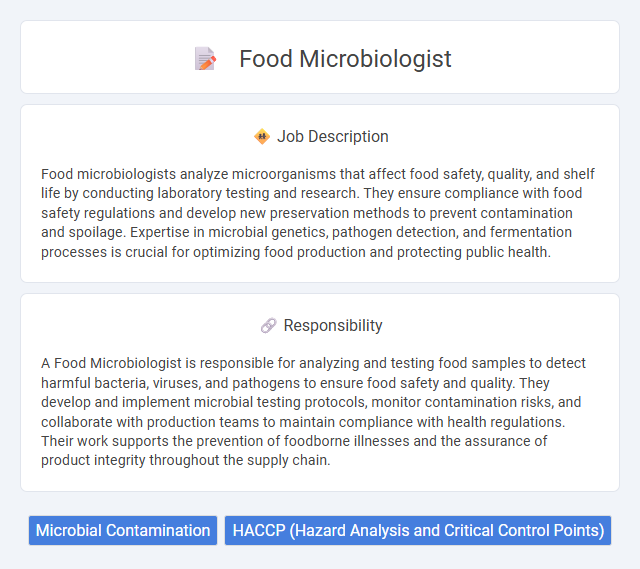
Food microbiologists analyze microorganisms that affect food safety, quality, and shelf life by conducting laboratory testing and research. They ensure compliance with food safety regulations and develop new preservation methods to prevent contamination and spoilage. Expertise in microbial genetics, pathogen detection, and fermentation processes is crucial for optimizing food production and protecting public health.
Individuals with strong attention to detail and a keen interest in microbiology and food safety are likely suitable for a Food Microbiologist role. Those who prefer laboratory work, handling microorganisms, and conducting experiments may find this job fitting their skills and temperaments. People who are uncomfortable with strict safety protocols or repetitive testing might find this career less appropriate.
Qualification
Food Microbiologists require a bachelor's degree in microbiology, food science, or a related field, with many positions favoring candidates holding a master's or Ph.D. specializing in food safety, microbial physiology, or industrial microbiology. Proficiency in laboratory techniques such as microbial culturing, DNA analysis, and pathogen detection is essential, along with knowledge of FDA, USDA, and HACCP regulations. Strong analytical skills and experience with quality control systems ensure effective monitoring of foodborne microorganisms and contamination prevention.
Responsibility
A Food Microbiologist is responsible for analyzing and testing food samples to detect harmful bacteria, viruses, and pathogens to ensure food safety and quality. They develop and implement microbial testing protocols, monitor contamination risks, and collaborate with production teams to maintain compliance with health regulations. Their work supports the prevention of foodborne illnesses and the assurance of product integrity throughout the supply chain.
Benefit
Food microbiologists likely enjoy career benefits such as contributing to public health by ensuring food safety and preventing contamination. They probably experience job stability and growth prospects due to increasing demand for food quality control. Opportunities for research innovation and collaboration with regulatory agencies may further enhance their professional satisfaction and skill development.
Challenge
The role of a food microbiologist likely involves navigating the challenge of detecting and controlling harmful microorganisms in complex food matrices to ensure safety and compliance with regulations. Managing contamination risks while maintaining product quality may require continual adaptation to emerging pathogens and evolving industry standards. The probability of encountering unexpected microbial resistance or spoilage agents could make problem-solving and innovation essential aspects of the job.
Career Advancement
Food microbiologists gain expertise in food safety, pathogen control, and quality assurance, which opens pathways to advanced roles such as senior research scientist, quality control manager, or regulatory affairs specialist. Mastery of microbiological testing methods and adherence to FDA and USDA standards enhance opportunities in product development and food safety consultancy. Continuous professional development, including advanced degrees and certifications like CFS (Certified Food Scientist), significantly improves prospects for leadership positions and specialized research roles.
Key Terms
Microbial Contamination
Food microbiologists specialize in detecting and controlling microbial contamination to ensure food safety and quality. They use advanced techniques to identify pathogens such as Salmonella, Listeria, and E. coli that can compromise food products. Their work involves developing protocols to prevent contamination during processing, storage, and distribution, minimizing foodborne illnesses and product spoilage.
HACCP (Hazard Analysis and Critical Control Points)
Food Microbiologists play a crucial role in implementing and monitoring HACCP (Hazard Analysis and Critical Control Points) systems to ensure food safety by identifying, evaluating, and controlling biological hazards in food production processes. They analyze microbial contamination risks, establish critical control points, and validate sanitation procedures to prevent foodborne illnesses and ensure compliance with regulatory standards. Expertise in HACCP principles enables Food Microbiologists to design effective food safety protocols, conduct risk assessments, and support quality assurance teams in maintaining safe food supply chains.
 kuljobs.com
kuljobs.com